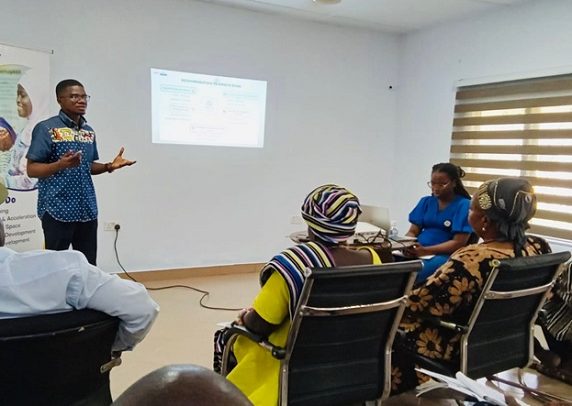Emmanuel Acquah addressing participants in Damongo
Chief Executive Officer (CEO) of the Africa Centre for Entrepreneurship and Youth Empowerment (ACEYE), Emmanuel Acquah, has stated that the country’s cumbersome business registration process stifles entrepreneurship, posing a significant barrier to growth for startups and MSMEs.
He made this observation during the policy think-tank’s Radio Entrepreneurship Program in Damongo, in the Savannah Region.
According to him, many businesses remain unregistered due to the unfriendly and complex procedures entrepreneurs must navigate to complete the registration process.
“Our studies across the country have revealed that a lot of businesses are unregistered. This is largely due to cumbersome registration procedures and processes,” Mr. Acquah stated.
He believes that, similar to the government’s implementation of mobile money interoperability, there should be better communication between various regulatory bodies to reduce bureaucracy.
“There should be a mechanism where the initial certificate issued by the Office of the Registrar of Businesses is made available and accessible to all other regulatory bodies and authorities spontaneously,” he suggested.
“This will drastically reduce the time spent trying to comply with the system and lower the cost of registering a business in Ghana, thereby encouraging entrepreneurs to formalize their businesses and increasing government tax revenue.”
While acknowledging the government’s efforts to create an environment conducive to increased production, Mr. Acquah pointed out that high tax burdens and stringent business registration regulations had driven many businesses away from production towards merchandising.
He asserted that for the government to fully realize its policy of making the Ghanaian economy more production-efficient, it must reconsider the business registration processes.
Hajia Dr. Kansawurchea Bukari Azara, President of the Queen Mothers’ Platform in the Savannah Region, encouraged the youth to venture into agriculture and entrepreneurship while they are still young.
“The best time to start the entrepreneurial journey is while you’re still young. Don’t wait to retire before you become an entrepreneur. Start small, grow it, and grow with it,” she advised.
She added that, while capital is essential for starting a business, the right people and environment are even more critical.
“Yes, you need money to start a business, but as young people, leverage your strengths, connections, skills, associations, and networks. Form groups and start something. That way, you can grow your personal economy and the economy of your people,” she concluded.
FROM Eric Kombat, Damongo


